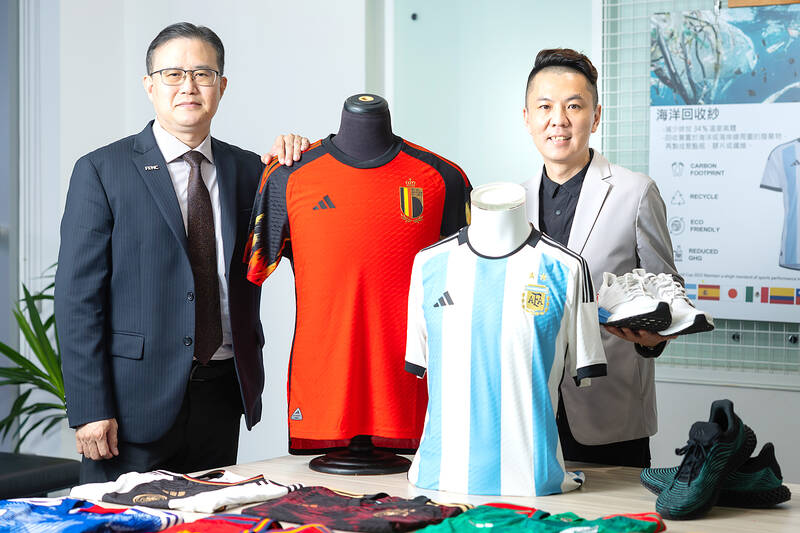Major Taiwanese textile suppliers that have long been part of the supply chain of FIFA World Cups are using their advanced technologies to transform recycled plastic waste into soccer jerseys and accessories, tapping into tremendous business opportunities.
Far Eastern New Century Corp is one of them. The textile brand has closely worked with Adidas and environmental organization Parley for the Ocean to make jerseys from marine plastic waste.
In this year’s tournament, which kicks off tonight, seven teams — Germany, Japan, Spain, Argentina, Mexico, Belgium and Wales — use Far Eastern-made jerseys, while an additional two teams wore them in their unsuccessful qualification bids.

Photo: CNA
Mexico have even been selected by several international news media as the “best dressed” team.
“Mexico have never been short on strong designs, but even by their lofty standards, their 2022 kits are impressive,” ESPN said. “The detailed pattern emanating from the collar and stretching all down the front of the shirt — a nod to Quetzalcoatl, an Aztec god whose name translates to ‘feathered serpent’ — grabs your attention and refuses to let go.”
The World Cup, running through Dec. 18 in Qatar, is expected to attract a record 5 billion viewers across the world, creating hundreds of billions of US dollars in business opportunities for suppliers of merchandise, soccer’s world governing body FIFA estimated.
Huang Chuan-yi (黃全億), a manager in Far Eastern’s long fiber division, said that his company has spent about seven years to develop products from marine plastic waste, and this year is the first time it can demonstrate its prowess at a big international event.
Huang said Far Eastern has been part of supply chains for World Cups for more than 10 years.
Far Eastern also produced jerseys from recycled marine waste for the soccer clubs Bayern Munich and Real Madrid, he said.
Huang said Far Eastern’s 200 research-and-development experts need at least three years to develop new products.
Shinkong Synthetic Fibers Corp has also been a major player in the World Cup supply chain for more than a decade, said Lo Shih-chuan (羅時銓), deputy head of the 55-year-old firm’s decisionmaking committee.
Lo said his company has been developing yarn based on recycled PET bottles for many years and has built a solid customer base with high loyalty.
The recycling rate of PET bottles in Taiwan is 95 percent, the highest in the world, helping the company source its base material, Lo said.
Shinkong has secured patents for its Shin Sigma 3.0 technologies, which help its products draw moisture away from the body, Lo said, calling it a key property for sports clothes.
Shinkong’s products are light-weight and opaque, Lo said, adding that the company uses low carbon emissions technology to produce them.
Local textile firms are good at integrating resources from upstream, middle-stream and downstream segments to produce yarn, cloth and finished garments, Lo said.
Its products are successful in the global market, he said, citing FIFA World Cup 2018 in Russia, where Taiwanese textile firms accounted for more than 80 percent of the supply chain.

Alain Robert, known as the "French Spider-Man," praised Alex Honnold as exceptionally well-prepared after the US climber completed a free solo ascent of Taipei 101 yesterday. Robert said Honnold's ascent of the 508m-tall skyscraper in just more than one-and-a-half hours without using safety ropes or equipment was a remarkable achievement. "This is my life," he said in an interview conducted in French, adding that he liked the feeling of being "on the edge of danger." The 63-year-old Frenchman climbed Taipei 101 using ropes in December 2004, taking about four hours to reach the top. On a one-to-10 scale of difficulty, Robert said Taipei 101

A preclearance service to facilitate entry for people traveling to select airports in Japan would be available from Thursday next week to Feb. 25 at Taiwan Taoyuan International Airport, Taoyuan International Airport Corp (TIAC) said on Tuesday. The service was first made available to Taiwanese travelers throughout the winter vacation of 2024 and during the Lunar New Year holiday. In addition to flights to the Japanese cities of Hakodate, Asahikawa, Akita, Sendai, Niigata, Okayama, Takamatsu, Kumamoto and Kagoshima, the service would be available to travelers to Kobe and Oita. The service can be accessed by passengers of 15 flight routes operated by

Taiwanese and US defense groups are collaborating to introduce deployable, semi-autonomous manufacturing systems for drones and components in a boost to the nation’s supply chain resilience. Taiwan’s G-Tech Optroelectronics Corp subsidiary GTOC and the US’ Aerkomm Inc on Friday announced an agreement with fellow US-based Firestorm Lab to adopt the latter’s xCell, a technology featuring 3D printers fitted in 6.1m container units. The systems enable aerial platforms and parts to be produced in high volumes from dispersed nodes capable of rapid redeployment, to minimize the risk of enemy strikes and to meet field requirements, they said. Firestorm chief technology officer Ian Muceus said

MORE FALL: An investigation into one of Xi’s key cronies, part of a broader ‘anti-corruption’ drive, indicates that he might have a deep distrust in the military, an expert said China’s latest military purge underscores systemic risks in its shift from collective leadership to sole rule under Chinese President Xi Jinping (習近平), and could disrupt its chain of command and military capabilities, a national security official said yesterday. If decisionmaking within the Chinese Communist Party has become “irrational” under one-man rule, the Taiwan Strait and the regional situation must be approached with extreme caution, given unforeseen risks, they added. The anonymous official made the remarks as China’s Central Military Commission Vice Chairman Zhang Youxia (張又俠) and Joint Staff Department Chief of Staff Liu Zhenli (劉振立) were reportedly being investigated for suspected “serious